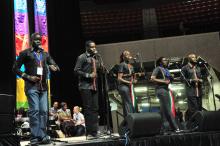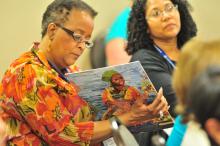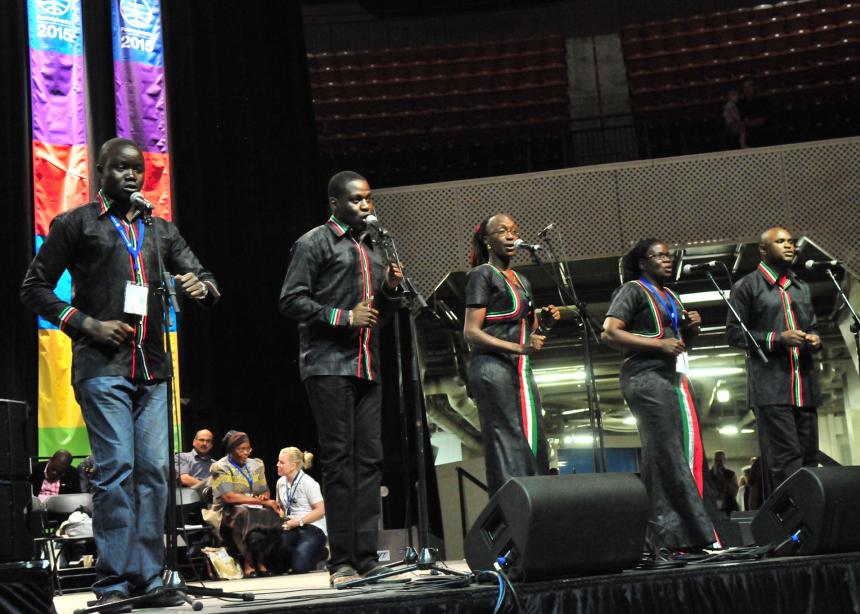Applying for a visa to enter the U.S. was serious business for many internationals hoping to attend PA 2015, the Mennonite World Conference (MWC) assembly held in Harrisburg, July 21-26, 2015.
MWC organizers report that 75 percent of the applicants who applied for a visa to attend the assembly were successful.
The MWC visa task force–with two members on the ground in Africa, one who moved between Africa and North America, four in Asia, and two in Latin America–assisted visa applicants in completing their paperwork and prepping for their embassy interviews.
Judy Zimmerman Herr and Bob Herr, who were coordinators of the visa task force, were based in the U.S. They organized letters of invitation from MWC, which applicants could use as part of their interview process when applying for a visa, and they maintained a link to the office of Customs and Border Protection, assisting with good communication for people who arrived at U.S. borders.
The U.S. required visas from 44 countries where members of MWC churches live. The investment for individual visa applicants was substantial-$160 USD in most places. Travel costs to consulates or embassies were on top of that.
Task force members observed some patterns in visa denials–those who did not own land, who did not have a career or steady work, who did not have a spouse and children in the country issuing their passports, or who had never traveled outside their country, were more likely to be turned down.
There are frequent surprises, as the following stories illustrate.
- “Mrs. A. had attended the last MWC assembly in Paraguay as a member of a choir that had sung there. The choir was hoping to sing again at PA 2015. In her embassy interview a few weeks ago, she was asked a series of questions in a local language and answered them in that language. Her visa was denied. She would not accept the denial, quickly switched her language to fluent English, and refused to take back her passport, asking again why she was denied. To avoid creating a scene, the interviewing officer asked her to come back the next day to collect her visa. When I picked up her passport for her the next day, the first thing I checked was whether her visa was present, and it was!”
- “It was heartbreaking to watch my own pastor be denied a visa. Twice. In my country, a pastor’s wife is also considered a pastor, although she has no paper credentials to verify this. So she was denied, too.”
- “Three young women who are currently living in Canada but come from a country that requires a U.S. visa, traveled to a U.S. consulate in another city in Canada for their visa interviews. When they arrived, they learned that the interviews had mistakenly not been booked. However, the folks at the consulate said, ‘But these women traveled all this way, so we need to give them their interviews.’ They made space in their schedule, and all three were granted their visas.”
- “A group of 18 women and one man landed at my home one night around 9:00, wanting a place to sleep. The communication had said that they would need a place to ‘wash their faces.’ My wife and I opened up every space we had to accommodate them. In the morning, they turned our home into a church service with song and prayer. It was good. But of the 19, only two women got their visas. I was very sad. I can imagine 17 participants in a hired bus, traveling 440 km back home, having been denied. We had rented space in an Internet Café and assisted them with their DS-160 application forms. Where did we go wrong?”
- “A particular brother was my partner in the whole process, having volunteered to encourage church members to attend PA 2015. He organized a group of six, including himself and his wife. His pastor was part of the group. Four of the six were interviewed by one officer and were granted their visas. My friend and his wife were interviewed by a different officer, and they were denied.”
- “A pastor from a rural area had a lot of interest in attending PA 2015. He went through all of the application steps, and on the day of his interview, security agents at the embassy helped him go through security so he wouldn’t be late for his interview. When the consular officer met with him, he told the pastor that he had no fingerprints, and regretfully, he couldn’t grant him a visa. Without fingerprints, the embassy would not have a digital identity for him on file. This brother had worked in construction since he was very young. During the last seven years, he worked in his family’s brick-making factory. He had worn his fingers down so that he had no fingerprints because of the hard work he had done since his youth in one of those jobs.”
- “Eleven people from an especially remote and very poor region of one country registered to attend PA 2015. Although I encouraged them to do this, I also really wondered if they would possibly get visas. Most of the people in the group had not traveled outside of the country before, and they were getting their passports for the first time for this occasion, too. They traveled to the capital city (an hour flight, or a 20-hour bus trip) for their visa appointment. I was thrilled when all 11 of them walked into my office with smiles on their faces, all of them having received their visas.”
The visa task force reports that 1,800 individuals registered for the assembly required visas. MWC officially invited 1,300 of those. These were endorsed by their church in a recognized way, and were able to pay their fair-share registration. The others, just over 500, either did not complete the MWC registration process, could not acquire an endorsement from their church or were from a non-member church, or could not meet the financial requirements. So these fell away before any visa process was started. There were also individuals who were already holding a valid visa and did not need help from MWC.
Of the 1,300 who qualified and received letters of invitation, about 200 could not proceed to a visa application process. This could have been for a variety of reasons: their church could not come together enough to support participants, they waited too long to try to get an appointment at a U.S. embassy, or specific internal MWC church issues delayed or prevented people from getting to the visa interview process.
June and July are always fully scheduled for U.S. embassies, and for two weeks in June the U.S. State Department reported experiencing a “cyber-glitch” that affected their bio-metric data. This was not cleared up till the end of June and impacted about 30 of the 44 U.S. embassies that MWC folks needed to work with.
The task force reports that of the approximately 1,100 who did get to a visa interview, about 830 were successful in obtaining a visa.
The success for visa applications was uneven. The task force had anticipated that young people attending the Global Youth Summit would have a hard time. This was sometimes true but not always. It was anticipated that economic realities would make some applications difficult. This was true, but there were as well many exceptions to this, which was a surprise.
Latin America had an acceptance rate higher than 70 percent, and Africa had about 50 percent—not unexpected.
The task force is not aware of any issues involving border-crossing. From the many who came to the Assembly the task force received only one story of extra questioning, and that story had some explanation that made the questions understandable.

A group of five singers from Kenya sang at the Thursday evening worship service. Of the choir of 30, only these five received visas to come to the U. S. (Photo by Dale D. Gehman for Meetinghouse)

Due to visa complications, some women from Africa were absent from a gathering of MWC women theologians who came from various continents. In solidarity with their missing sisters, the group at PA 2015 decided to send a panel of artwork to the women who were not able to get visas to the U.S. They were invited to sign the back of the artwork. (Photo by Dale D. Gehman for Meetinghouse)


Add new comment
Canadian Mennonite invites comments and encourages constructive discussion about our content. Actual full names (first and last) are required. Comments are moderated and may be edited. They will not appear online until approved and will be posted during business hours. Some comments may be reproduced in print.